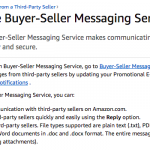
Section 230 Helps Facebook Easily Defeat Claims Over a User’s Post–Richard v. Facebook
A former employee, Malepeai, posted negative remarks on Facebook about his past employer and his family. The past employer sued Facebook for defamation, civil conspiracy, outrage, and intentional infliction of emotional distress. This direct assault on Facebook for third party…
Amazon Isn’t Liable for Defective Marketplace Sale (No Thanks to Section 230)–Erie Insurance v. Amazon
A buyer purchased an LED headlamp in Amazon’s marketplace from a third party merchant (“Dream Light”) and gave it as a gift. The batteries allegedly malfunctioned and caused a fire in the gift-receiver’s house. The home insurer paid $313k+ for…
Section 230 Protects Tor Project from Liability for Tragic Drug Overdose–Seaver v. Estate of Cazes
This case involves the tragic death of a 13 year old boy from ingesting an illegal opioid (U-47700) he bought via the dark web. Allegedly, the boy used a Tor browser to find and purchase the drug. Among other defendants,…
A Recap of My Recent Section 230 Papers
I’ve been actively writing about Section 230 recently, so I thought it might help to round them up into a single post: * An Overview of the United States’ Section 230 Internet Immunity (2019). This is the basic primer you’ve always wanted….
New Multi-Disciplinary Course Improves Communications Among Silicon Valley Professionals (SCU Press Release)
[Eric’s introduction: This project took several years to develop. I think it breaks some important pedagogical ground, so I’m thrilled to share this news.] SANTA CLARA, Calif., May 16, 2019 – This year, Santa Clara University launched an innovative new multi-disciplinary course…

Court Rejects Service of Process Via Amazon Messaging–Noco v. Chang
This is a trademark infringement lawsuit. Plaintiff alleges that defendant improperly uses plaintiff’s brand name to sell infringing or counterfeit products “entirely online through [an] Amazon merchant account.” Defendant used the merchant account named “Co2Crea,” and defendant also applied to…
Terminated AdSense Publishers Can’t Get Their Accrued Earnings–eOnline v. Google
The plaintiffs are publishers that participated in the Google AdSense program. They outsourced much of their content development to a service called TextBroker that pays authors between 0.7 and 5 cents per word (i.e., a 1000 word article makes between…

A Fight for Authorship and Ownership of 150+ Quilt Patterns, and Bad Business Planning (Guest Blog Post)
by guest blogger Elizabeth Townsend Gard, Professor of Law (Tulane Law School); Lepage Faculty Fellow (A.B. Freeman School of Business); and host, Just Wanna Quilt podcast Quilts are a little bit in the (copyright) news. What is a quilt? There are three parts…
Section 230 Protects Facebook’s Account and Content Restriction Decisions–Ebeid v. Facebook
Courts, at least in the Ninth Circuit, have collapsed the distinction between Sections 230(c)(1) and 230(c)(2). As a result, (c)(1) now routinely protects a service’s content filtering and account restriction decisions, which is nominally the job of (c)(2). This is…

Using Third Party Trademarks as Hashtags Creates an Implied Association–Align v. Strauss (Guest Blog Post)
by guest blogger Alexandra Jane Roberts When does using a competitor’s trademark as a hashtag create a false impression of association? While plenty of cases have assessed whether a company’s use of competitors’ marks in its advertisements constitutes trademark infringement,…
